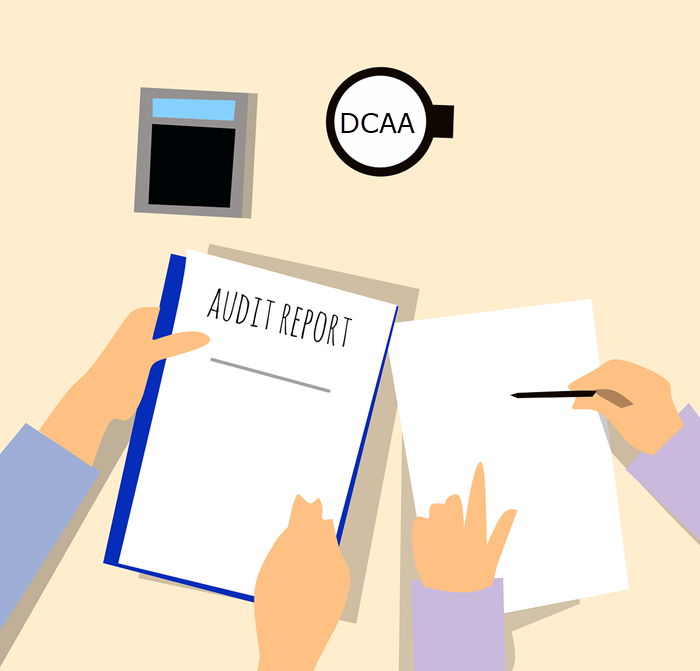This article summarizes what a small business owner can expect from the DCAA labor and timekeeping audits and some suggestions on how to do it effectively. Also, it talks about the changes implemented in the audit during COVID-19.

What DCAA looks for when doing its audits
The main goal for the Audit is to verify if the contractor is following the conditions set in the DCAA contracts in terms of labor charging, cost allocation and timekeeping. It also looks into how the labor is charged for various types of contracts like fixed-price or cost-based.
How DCAA Audits are done
DCAA Audits are not announced in advance. The auditors come to the work location unannounced and request a meeting with facility supervisor and employees. Documents required are:
- Employees and their location
- What Timekeeping procedure is being used
- What telecommuting programs are in place (this is specially important during COVID-19)
- A point of contact for employees at each location
DCAA interviews the employees of the organization as to the current happenings as per specified in the Contract Audit Manual (CAM) explains how DCAA performs the audit. This is so that the employees usually forget happenings in the past.
The auditors essentially evaluates various risks while doing the audit. They usually:
- Get themselves familiar with the contractor’s organization policies like:
- Employees in each location
- Labor charges
- Policies given to the employees
- Current contract mix for fixed price or cost type contracts
- Assess the risk by looking at various things such as:
- Risk for labor mischarging. For example, if the same location is doing multiple types of contracts, they will check if the employees are charging in cost type contracts where they are supposed to charge for fixed-price contracts.
- Accurate time worked is not entered into the timesheet or time is charged, but no work is done. This is also ascertained by floor checks (as described below)
- The labor costs are properly recorded as per contract.
- Contractors moving cost from overrun projects to under-run projects.
- Pattern of increase in direct and indirect labor in GL accounts.
- Charging labors from other contracts specially at offsite.
Floor Checks
This is where the auditors will check if the time recorded in the timesheet is consistent with the time employee actually worked and the time used for billing and payroll. This is supposed to be a quick check where the risk is low for the government. The following are considered:
- Is the time accurately recorded in the timekeeping system
- Are projects, tasks and areas specified correctly
- Is the timesheet done on the same day the work is performed
- Are the time entries checked by the supervisor and approved
- The timesheet is compared with the billing and the payroll information
- There is a division of responsibility for the person managing the timesheet, managing the operations budgets, billing and payroll
- Proper procedures are implemented for recording time in the timesheet, and employees understand these procedures
What changed during COVID-19
During the COVID-19 pandemic period, most audit will be done online via email and exchanging the documents. The auditors may send questions to the employees and request supporting documents. Most of it will be related to employees working from home (as discussed above). DCAA will follow up with detailed audit after the pandemic ends.
Few suggestions for the business owners
Even though the DCAA audits are unannounced, there are few things you can follow to reduce your risk:
- When they arrive, have a person responsible for asking them their complete procedure so that you are not surprised when they start asking questions to your employees
- Make sure the person responsible for your company walks with the auditor during interviews and floor check.
- Point out if they ask questions not related to the audit
- Comply and provide supported document when requested
In addition, it may also help to do a mock audit and floor check in your company, much like fire drill is done in many places.
OfficeClip Timesheet DCAA module can help make most of the timekeeping audit simpler.
References used:
https://www.dcaa.mil/Portals/88/Labor_Evaluations.pdf?ver=2019-10-15-162522-913
https://www.dcaa.mil/Guidance/CAM-Contract-Audit-Manual/
Audit Alert on Limited Contractor Access Due to COVID-19.pdf?ver=2020-04-14-132027-790
SK Dutta is a software architect and creator of OfficeClip Suite of products. He loves to design and develop software that makes people do their job better and more fun. He always explores ways to improve productivity for small businesses. He is also an avid reader in many areas, including psychology, productivity, and business.

